|
|
|
Sort Order |
|
|
|
Items / Page
|
|
|
|
|
|
|
| Srl | Item |
| 1 |
ID:
144255
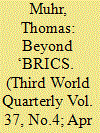

|
|
|
|
|
| Summary/Abstract |
Grounded in a review of past and present academic South–South cooperation literatures, this article advances ten theses that problematise empirical, theoretical, conceptual and methodological issues essential to discussions of South–South cooperation in the 21st century. This endeavour is motivated by the perceived undermining, especially in the contemporary Anglophone academic South–South cooperation literature, of the emancipatory potential historically associated with South–South cooperation. By drawing on the interventionist South–South cooperation agendas of ‘left’-leaning Latin America-Caribbean governments, the article seeks to establish a dialogue between social science theories and less ‘visible’ analyses from academic (semi)peripheries. The ten theses culminate in an exploration of the potential of South–South cooperation to promote ‘alternative’ development.
|
|
|
|
|
|
|
|
|
|
|
|
|
|
|
|
| 2 |
ID:
144260
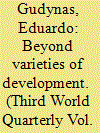

|
|
|
|
|
| Summary/Abstract |
Many South–South cooperation programmes have promoted development without fully discussing the implications of that concept. To evaluate this situation, recent heterodox development strategies are examined, particularly those under progressivist governments in South America. It is found that development strategies are certainly plural, but they all share a common pre-political background. To address this feature, the concept of ‘varieties of development’ is introduced. Then a new typology on the disputes over development is presented. Three types are recognised (controversies within a specific variety of development; disputes among different varieties; and disputes on alternatives to all varieties of development). The concept of Buen Vivir is presented as an alternative to development, and disputes of the third type, that involve this concept, are examined. Paradoxically, as the current focus of South–South cooperation is to reinforce conventional varieties of development, it is blocking alternatives, even the Southern option of Buen Vivir.
|
|
|
|
|
|
|
|
|
|
|
|
|
|
|
|
| 3 |
ID:
144254


|
|
|
|
|
| Summary/Abstract |
Funded at $100 billion each, the BRICS Contingent Reserve Arrangement (CRA) and New Development Bank (NDB) represent ‘sub-imperial’ finance, insofar as, by all indications, they fit into – instead of providing alternatives to – the prevailing world systems of sovereign debt and project credits. Balance of payments constraints for BRICS members will not be relieved by the CRA, which requires an IMF intervention after just 30% of the quota is borrowed. In this context the NDB would appear close to the Bretton Woods Institution model, promoting frenetic extractivist calculations based on US dollar financing and hence more pressure to export.
|
|
|
|
|
|
|
|
|
|
|
|
|
|
|
|
| 4 |
ID:
144252
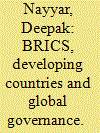

|
|
|
|
|
| Summary/Abstract |
This article analyses the implications and consequences of the rise of BRICS for the developing world and for global governance. In doing so, it examines BRICS’ increasing importance among developing countries and their growing significance in the world economy, situated in historical perspective, and considers the factors underlying the evolution of the group as an economic and political formation. This is followed by an analysis of the possible economic impact of future growth in BRICS on other developing countries, which could be complementary or competitive, positive or negative. In conclusion it discusses the potential influence of BRICS, extending beyond economics to politics, in the wider global context, with reference to international institutions and cooperation among developing countries.
|
|
|
|
|
|
|
|
|
|
|
|
|
|
|
|
| 5 |
ID:
144253
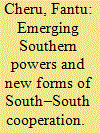

|
|
|
|
|
| Summary/Abstract |
This article critically examines Ethiopia’s engagement with China and India. Despite being a non-oil exporting country, Ethiopia has become one of the fastest growing economies in Africa and, over the past decade, millions of people have been lifted out of poverty. Part of Ethiopia’s success has been the ability of the developmental state to harness its relationship with the new as well as the traditional development partners strategically, to unleash the country’s productive potential while maintaining national policy space. Ethiopia’s pragmatic ‘economic diplomacy’ arose from the desire of the liberation movements that formed the umbrella Ethiopian People’s Revolutionary Democratic Front (EPRDF) to fundamentally transform all aspects of Ethiopian society and to break out of poverty, which the EPRDF considers a ‘national shame’ and a handicap to the country’s ability to define foreign and development policies independently. The Ethiopian experience challenges the school of thought that equates the rise of emerging powers in Africa with a new form of ‘colonialism’, disregarding African agency to transform these relationship into ‘win-win’ partnerships.
|
|
|
|
|
|
|
|
|
|
|
|
|
|
|
|
| 6 |
ID:
144258
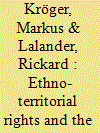

|
|
|
|
|
| Summary/Abstract |
In recent times a growing number of Latin American rural groups have achieved extended ethno-territorial rights, and large territories have been protected by progressive constitutions. These were the outcomes of extended cycles of national and transnational contentious politics and of social movement struggle, including collective South–South cooperation. However, the continent has simultaneously experienced a resource extraction boom. Frequently the extractivism takes place in protected areas and/or Indigenous territories. Consequently economic interests collide with the protection and recognition of constitutional rights. Through a review of selected demonstrative cases across Latin America, this article analyses the (de jure) rights on paper versus the (de facto) rights in practice.
|
|
|
|
|
|
|
|
|
|
|
|
|
|
|
|
| 7 |
ID:
144262
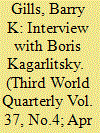

|
|
|
|
|
| Summary/Abstract |
In this interview Boris Kagarlitsky discusses the significance of contemporary ideas surrounding South–South Relations, the continuities and discontinuities between the ‘global South’ and previous notions of the ‘Third World’, and whether such changes in the world economy of over the past half a century can be understood as a form of hegemonic transition. Kagarlitsky also addresses the role of the various social forces and movements of the global South within these emerging South–South relations. Finally, he addresses the question of the role of the Russian Federation in the world system following the global crisis.
|
|
|
|
|
|
|
|
|
|
|
|
|
|
|
|
| 8 |
ID:
144256
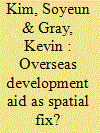

|
|
|
|
|
| Summary/Abstract |
This paper examines the extent to which South Korea’s developmental aid programme to Africa can be understood as a form of ‘aid as imperialism’. We argue against the depiction of a crude determinism between the ‘interests of capital’ and the international activism of the South Korean state through aid provision. Drawing on Harvey’s theory of the new imperialism, we argue that, while the structural transformations in the South Korean political economy explain Seoul’s ODA programme at a general level, it is strongly influenced by geopolitical objectives which often undermine South Korea’s ability to pursue distinctly mercantile aims.
|
|
|
|
|
|
|
|
|
|
|
|
|
|
|
|
| 9 |
ID:
144259
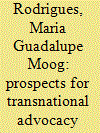

|
|
|
|
|
| Summary/Abstract |
The literature on transnational advocacy networks (TANs) suggests that they may be a valid option for activists in India, Brazil and South Africa (the members of the IBSA bloc) to coordinate efforts to influence their states’ foreign policy. Since its formation the IBSA bloc has formalised spaces for networking among governmental officials, business interests and academics. Yet there are no examples of TANs whose activism has occurred across IBSA, with the purpose of influencing the bloc’s policies. This case study of the challenges that Brazilian advocacy groups face in forging TANs with like-minded groups across IBSA sheds light on the challenges confronting activists and suggests ways of overcoming them.
|
|
|
|
|
|
|
|
|
|
|
|
|
|
|
|
| 10 |
ID:
144257
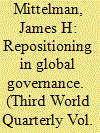

|
|
|
|
|
| Summary/Abstract |
This exploratory case study of repositioning focuses on changing relations among actors and the structures of global governance. It examines interactions between formal institutions, particularly the IMF, and informal networks of authority manifested in global forums, such as the G7/G8 and G20. The core argument is that global repositioning may be best understood in terms of increasing pliability in neoliberal globalisation. Pliable neoliberalism encompasses elasticity in practices and the stretching of spatial and institutional networks, plus pushback in the global North and South. It has two axes, one lateral and the other longitudinal. The former constitutes changes in global governance institutions; the latter turns on the resilience of neoliberalism and challenges to it. Horizontal shifts in global governance, as in changes in membership organisations, are made possible by verticality – hierarchies in social power relations. The evidence is drawn from documentary research and semi-structured discussions with global governance officials in Africa, Europe and North America.
|
|
|
|
|
|
|
|
|
|
|
|
|
|
|
|
| 11 |
ID:
144261
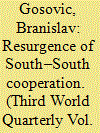

|
|
|
|
|
| Summary/Abstract |
This essay undertakes to depict, in broad strokes, the evolution, obstacles and main junctures in the history of South–South cooperation. It also suggests some practical and feasible ways for overcoming difficulties, ways that could infuse this aspect of international development cooperation with greater dynamism, more fully tap its inherent and growing potential for the attainment of the practical and systemic objectives that developing countries have for decades been striving for in the North–South development dialogue and negotiations, and strengthen these countries’ influence and role in world affairs and global governance.
|
|
|
|
|
|
|
|
|
|
|
|
|
|
|
|
| 12 |
ID:
144251
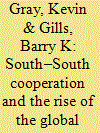

|
|
|
|
|
| Summary/Abstract |
In this introductory article we examine the recent resurgence of South–South cooperation, which has moved once again onto the centre stage of world politics and economics, leading to a renewed interest in its historic promise to transform world order. We provide an overview of contemporary debates surrounding this resurgence, noting in particular the division between those who are optimistic with regard to the potential of Southern economic development and the project of liberation from Northern domination, and the more pessimistic critics, who see this very success of the South as being subsumed within the existing global capitalist development paradigm.
|
|
|
|
|
|
|
|
|
|
|
|
|
|
|
|
|
|
|
|
|